Blockchain Regulation Matrix
The Blockchain Regulation Matrix (BRM) establishes a framework outlining the concerns of regulating the blockchain from both the government and the consumer perspective, and in doing so, provides a pragmatic and clear approach to Web3 regulation. The BRM outlines regulation aspects of the blockchain by viewing it as a blockchain stack in many layers starting with the electricity physically supporting the blockchain at the base layer, all the way to the process of offloading crypto to fiat currency. With centralization and decentralization on either side of the matrix, the primary objective of the BRM is to understand where and how regulation of the blockchain should be developed specific to each layer.
Beginning with the electricty supporting the blockchain, as you hover over the images of each row, you'll see the specifics for that topic within that layer. The left side refers to projects that are centralized, while the right side refers to projects that are decentralized. For example, if there was an organization or business that wanted to provide electricity to miners in their area, that would be a centralized project. However, if there was a solar farm operating as a DAO that wanted to provide electricity to miners, that could be a decentralized project.
There are two illustrations of the Blockchain Regulation Matrix below, a short-form immediately below and a long-form afterwards.
Hover over each of the images below to read more information.
ElectricityGovernment Concerns
- Protecting consumers from loss of use due to a geopolitical situation
- Amount of electricity required to maintain the blockchain and the amount per transaction
- Concentration of electricity supplied to a blockchain from within countries or areas.
Consumer Risks
- Potential geopolitical risks leading to electricity access disruptions
Cons to over-regulation
- Inability to use the blockchain to solve real-world problems
- Inhibiting technological growth
- Limiting economic growth
Cons to lack of regulation
- Potential risks of concentration and control by certain countries
Government Concerns
- Protecting consumers from loss of use due to a geopolitical situation
- Amount of electricity required to maintain the blockchain and the amount per transaction
- Concentration of electricity supplied to a blockchain from within countries or areas.
Consumer Risks
- Potential geopolitical risks leading to electricity access disruptions
Cons to over-regulation
- Inability to use the blockchain to solve real-world problems
- Inhibiting technological growth
- Limiting economic growth
Cons to lack of regulation
- Potential risks of concentration and control by certain countries
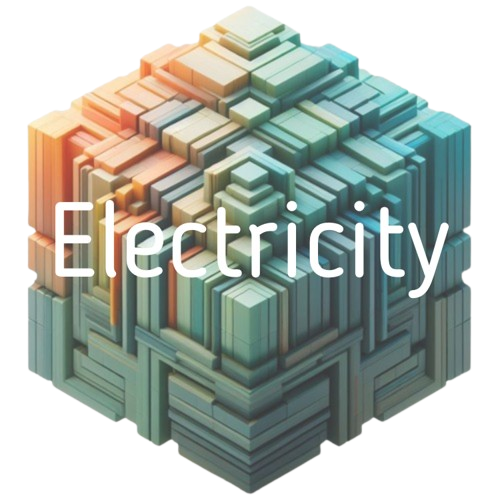
This row applies only to entities that are producing the electricity that powers the blockchain.
ElectricityGovernment Concerns
- Protecting Consumers from loss of use due to a geopolitical situation
- Amount of electricity required to maintain the blockchain and the amount per transaction
Consumer Risks
- Potential geopolitical risks leading to electricity access disruptions
Cons to over-regulation
- Potential geopolitical risks leading to electricity access disruptions
Cons to lack of regulation
- Potential risks of concentration and control by certain countries
Government Concerns
- Protecting Consumers from loss of use due to a geopolitical situation
- Amount of electricity required to maintain the blockchain and the amount per transaction
Consumer Risks
- Potential geopolitical risks leading to electricity access disruptions
Cons to over-regulation
- Potential geopolitical risks leading to electricity access disruptions
Cons to lack of regulation
- Potential risks of concentration and control by certain countries
Settlement LayerGovernment Concerns
- Not being able to update / edit fraudulent transactions
- Not being able to identify immoral activity that could be deemed fraudulent
Consumer Risks
- Lack of due diligence
- Security and attacks
Cons to over-regulation
- Inability to use the blockchain to solve real-world problems
- Inhibiting technological growth
Cons to lack of regulation
- Potential displacement of development activities to more permissive jurisdictions
Does blockchain technology currently exist to fulfill the above concerns, and if so, what is it?
- Proof of Stake (PoS) consensus algorithms that require significantly less energy
Government Concerns
- Not being able to update / edit fraudulent transactions
- Not being able to identify immoral activity that could be deemed fraudulent
Consumer Risks
- Lack of due diligence
- Security and attacks
Cons to over-regulation
- Inability to use the blockchain to solve real-world problems
- Inhibiting technological growth
Cons to lack of regulation
- Potential displacement of development activities to more permissive jurisdictions
Does blockchain technology currently exist to fulfill the above concerns, and if so, what is it?
- Proof of Stake (PoS) consensus algorithms that require significantly less energy

This row applies only to the layer of the blockchain where transactions settle permanently.
Settlement LayerGovernment Concerns
- Not being able to update / edit fraudulent transactions
- Not being able to identify immoral activity that could be deemed fraudulent
Consumer Risks
- Lack of due diligence
- Security and attacks
Cons to over-regulation
- Potential centralization of the blockchain settlement layer.
Cons to lack of regulation
- Potential displacement of development activities to more permissive jurisdictions
Does blockchain technology currently exist to fulfill these obligations, and if so, what is it?
- Proof of Stake (PoS) consensus algorithms that require significantly less energy
- Byzantine Fault Tolerance (BFT) protocols ensuring fault tolerance
- Advanced encryption techniques for secure transactions and data privacy
Government Concerns
- Not being able to update / edit fraudulent transactions
- Not being able to identify immoral activity that could be deemed fraudulent
Consumer Risks
- Lack of due diligence
- Security and attacks
Cons to over-regulation
- Potential centralization of the blockchain settlement layer.
Cons to lack of regulation
- Potential displacement of development activities to more permissive jurisdictions
Does blockchain technology currently exist to fulfill these obligations, and if so, what is it?
- Proof of Stake (PoS) consensus algorithms that require significantly less energy
- Byzantine Fault Tolerance (BFT) protocols ensuring fault tolerance
- Advanced encryption techniques for secure transactions and data privacy
Node / Validator LayerGovernment Concerns
- Not reporting income
- Fault tolerant consensus
- Decryption Standards
Consumer Risks
- Private Transactions
- Selective Transactions
- MEV Protection
Cons to over-regulation
- Centralization
- Inhibiting technological growth
Cons to lack of regulation
- Potential displacement of development activities to more permissive jurisdictions
- Transaction monitoring
- Selective transactions and private transactions
Does blockchain technology currently exist to fulfill these obligations, and if so, what is it?
Government Concerns
- Not reporting income
- Fault tolerant consensus
- Decryption Standards
Consumer Risks
- Private Transactions
- Selective Transactions
- MEV Protection
Cons to over-regulation
- Centralization
- Inhibiting technological growth
Cons to lack of regulation
- Potential displacement of development activities to more permissive jurisdictions
- Transaction monitoring
- Selective transactions and private transactions
Does blockchain technology currently exist to fulfill these obligations, and if so, what is it?
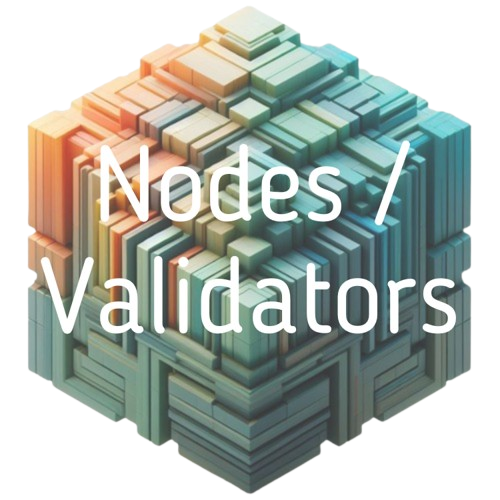
This row applies only to the nodes or validators that are validating the transactions for each block.
Node / Validator LayerGovernment Concerns
- Not reporting income
- Fault tolerant consensus
- Decryption Standards
Consumer Risks
- Private Transactions
- Selective Transactions
- MEV Protection
Cons to over-regulation
- Potential centralization of the nodes / validators layer.
- Potential displacement of development activities to more permissive jurisdictions
Cons to lack of regulation
- not being able to update or edit fraudulent transactions
Does blockchain technology currently exist to fulfill these obligations, and if so, what is it?
Government Concerns
- Not reporting income
- Fault tolerant consensus
- Decryption Standards
Consumer Risks
- Private Transactions
- Selective Transactions
- MEV Protection
Cons to over-regulation
- Potential centralization of the nodes / validators layer.
- Potential displacement of development activities to more permissive jurisdictions
Cons to lack of regulation
- not being able to update or edit fraudulent transactions
Does blockchain technology currently exist to fulfill these obligations, and if so, what is it?
Computation-intensive Consensus MechanismsGovernment Concerns
- Amount of electricity being used comparatively to similar technology that uses less
- Fault tolerant consensus
- Decryption Standards
Consumer Risks
- High energy consumption leading to environmental concerns
- Potential centralization of mining power
- Vulnerability to 51% attacks
Cons to over-regulation
- Stifling innovation and development of energy-efficient consensus mechanisms
- Driving blockchain projects to operate in jurisdictions with more favorable regulations
- Disincentivizing network participation due to excessive compliance requirements
Cons to lack of regulation
- Lack of standardization leading to security vulnerabilities
- Potential for concentration of power among mining entities
- Difficulty in addressing fraudulent or malicious activities
Does blockchain technology currently exist to fulfill these obligations, and if so, what is it?
Government Concerns
- Amount of electricity being used comparatively to similar technology that uses less
- Fault tolerant consensus
- Decryption Standards
Consumer Risks
- High energy consumption leading to environmental concerns
- Potential centralization of mining power
- Vulnerability to 51% attacks
Cons to over-regulation
- Stifling innovation and development of energy-efficient consensus mechanisms
- Driving blockchain projects to operate in jurisdictions with more favorable regulations
- Disincentivizing network participation due to excessive compliance requirements
Cons to lack of regulation
- Lack of standardization leading to security vulnerabilities
- Potential for concentration of power among mining entities
- Difficulty in addressing fraudulent or malicious activities
Does blockchain technology currently exist to fulfill these obligations, and if so, what is it?
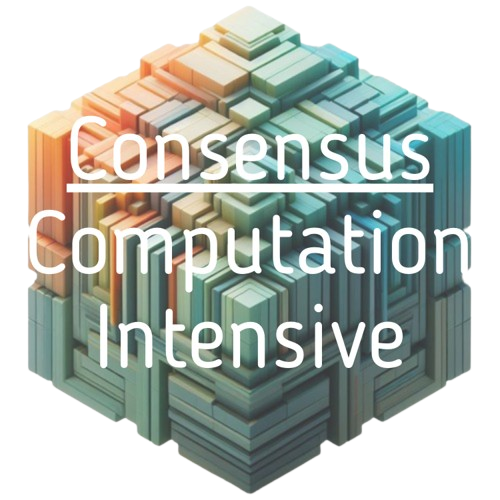
This row applies only to the blockchains with computation-intensive consensus mechanisms.
Computation-intensive Consensus MechanismsGovernment Concerns
- Amount of electricity being used comparatively to similar technology that uses less
- Fault tolerant consensus
- Decryption Standards
Consumer Risks
- High energy consumption leading to environmental concerns
- Potential centralization of mining power
- Vulnerability to 51% attacks
Cons to over-regulation
- Stifling innovation and development of energy-efficient consensus mechanisms
- Driving blockchain projects to operate in jurisdictions with more favorable regulations
- Disincentivizing network participation due to excessive compliance requirements
Cons to lack of regulation
- Lack of standardization leading to security vulnerabilities
Does blockchain technology currently exist to fulfill these obligations, and if so, what is it?
Government Concerns
- Amount of electricity being used comparatively to similar technology that uses less
- Fault tolerant consensus
- Decryption Standards
Consumer Risks
- High energy consumption leading to environmental concerns
- Potential centralization of mining power
- Vulnerability to 51% attacks
Cons to over-regulation
- Stifling innovation and development of energy-efficient consensus mechanisms
- Driving blockchain projects to operate in jurisdictions with more favorable regulations
- Disincentivizing network participation due to excessive compliance requirements
Cons to lack of regulation
- Lack of standardization leading to security vulnerabilities
Does blockchain technology currently exist to fulfill these obligations, and if so, what is it?
Capabilities-based Consensus MechanismsGovernment Concerns
- Upgrading consumer security standards
Consumer Risks
- Insufficient protection of user data and privacy
- Potential exposure to smart contract vulnerabilities
- Lack of recourse in case of unauthorized transactions
Cons to over-regulation
- Hampering innovation by imposing rigid security standards
- Reducing accessibility and inclusivity by raising entry barriers
- Limiting the potential of decentralized applications (dApps) due to excessive control
Cons to lack of regulation
- Proliferation of insecure smart contracts leading to financial losses
- Erosion of consumer trust and confidence in blockchain applications
- Difficulty in addressing cross-border disputes and fraudulent activities
Does blockchain technology currently exist to fulfill these obligations, and if so, what is it?
Government Concerns
- Upgrading consumer security standards
Consumer Risks
- Insufficient protection of user data and privacy
- Potential exposure to smart contract vulnerabilities
- Lack of recourse in case of unauthorized transactions
Cons to over-regulation
- Hampering innovation by imposing rigid security standards
- Reducing accessibility and inclusivity by raising entry barriers
- Limiting the potential of decentralized applications (dApps) due to excessive control
Cons to lack of regulation
- Proliferation of insecure smart contracts leading to financial losses
- Erosion of consumer trust and confidence in blockchain applications
- Difficulty in addressing cross-border disputes and fraudulent activities
Does blockchain technology currently exist to fulfill these obligations, and if so, what is it?
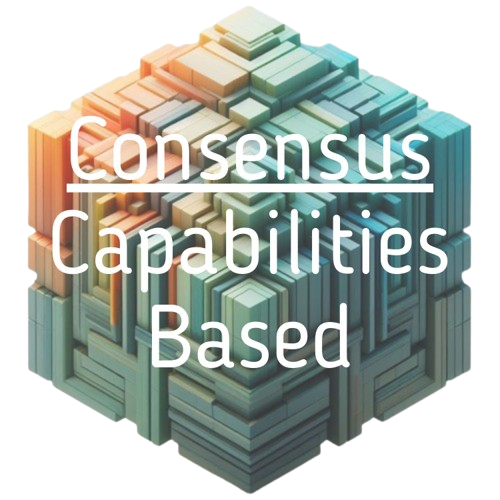
This row applies only to the blockchains with capabilities-based consensus mechanisms.
Capabilities-based Consensus MechanismsGovernment Concerns
- Upgrading consumer security standards
Consumer Risks
- Insufficient protection of user data and privacy
- Potential exposure to smart contract vulnerabilities
- Lack of recourse in case of unauthorized transactions
Cons to over-regulation
- Hampering innovation by imposing rigid security standards
- Reducing accessibility and inclusivity by raising entry barriers
- Limiting the potential of decentralized applications (dApps) due to excessive control
Cons to lack of regulation
- Proliferation of insecure smart contracts leading to financial losses
- Erosion of consumer trust and confidence in blockchain applications
- Difficulty in addressing cross-border disputes and fraudulent activities
Does blockchain technology currently exist to fulfill these obligations, and if so, what is it?
Government Concerns
- Upgrading consumer security standards
Consumer Risks
- Insufficient protection of user data and privacy
- Potential exposure to smart contract vulnerabilities
- Lack of recourse in case of unauthorized transactions
Cons to over-regulation
- Hampering innovation by imposing rigid security standards
- Reducing accessibility and inclusivity by raising entry barriers
- Limiting the potential of decentralized applications (dApps) due to excessive control
Cons to lack of regulation
- Proliferation of insecure smart contracts leading to financial losses
- Erosion of consumer trust and confidence in blockchain applications
- Difficulty in addressing cross-border disputes and fraudulent activities
Does blockchain technology currently exist to fulfill these obligations, and if so, what is it?
Voting-based Consensus MechanismsGovernment Concerns
- Ensuring fair and transparent voting processes
- Preventing voter fraud and manipulation
- Addressing potential collusion or vote-buying
Consumer Risks
- Lack of anonymity in voting leading to privacy concerns
- Vulnerability to Sybil attacks or stake concentration
- Complexity of verifying the legitimacy of votes
Cons to over-regulation
- Overly strict regulations hindering the flexibility and innovation of voting mechanisms
- Potential centralization of voting power due to stringent requirements
- Difficulty in adapting to rapidly changing technological advancements
Cons to lack of regulation
- Vulnerability to malicious attacks on the voting process
- Lack of accountability and transparency in voting results
- Challenges in addressing disputes and irregularities
Does blockchain technology currently exist to fulfill these obligations, and if so, what is it?
Government Concerns
- Ensuring fair and transparent voting processes
- Preventing voter fraud and manipulation
- Addressing potential collusion or vote-buying
Consumer Risks
- Lack of anonymity in voting leading to privacy concerns
- Vulnerability to Sybil attacks or stake concentration
- Complexity of verifying the legitimacy of votes
Cons to over-regulation
- Overly strict regulations hindering the flexibility and innovation of voting mechanisms
- Potential centralization of voting power due to stringent requirements
- Difficulty in adapting to rapidly changing technological advancements
Cons to lack of regulation
- Vulnerability to malicious attacks on the voting process
- Lack of accountability and transparency in voting results
- Challenges in addressing disputes and irregularities
Does blockchain technology currently exist to fulfill these obligations, and if so, what is it?

This row applies only to the blockchains with voting-based consensus mechanisms.
Voting-based Consensus MechanismsGovernment Concerns
- Ensuring fair and transparent voting processes
- Preventing voter fraud and manipulation
- Addressing potential collusion or vote-buying
Consumer Risks
- Lack of anonymity in voting leading to privacy concerns
- Vulnerability to Sybil attacks or stake concentration
- Complexity of verifying the legitimacy of votes
Cons to over-regulation
- Overly strict regulations hindering the flexibility and innovation of voting mechanisms
- Potential centralization of voting power due to stringent requirements
- Difficulty in adapting to rapidly changing technological advancements
Cons to lack of regulation
- Vulnerability to malicious attacks on the voting process
- Lack of accountability and transparency in voting results
- Challenges in addressing disputes and irregularities
Does blockchain technology currently exist to fulfill these obligations, and if so, what is it?
Government Concerns
- Ensuring fair and transparent voting processes
- Preventing voter fraud and manipulation
- Addressing potential collusion or vote-buying
Consumer Risks
- Lack of anonymity in voting leading to privacy concerns
- Vulnerability to Sybil attacks or stake concentration
- Complexity of verifying the legitimacy of votes
Cons to over-regulation
- Overly strict regulations hindering the flexibility and innovation of voting mechanisms
- Potential centralization of voting power due to stringent requirements
- Difficulty in adapting to rapidly changing technological advancements
Cons to lack of regulation
- Vulnerability to malicious attacks on the voting process
- Lack of accountability and transparency in voting results
- Challenges in addressing disputes and irregularities
Does blockchain technology currently exist to fulfill these obligations, and if so, what is it?
Transaction LayerGovernment Concerns
- Ensuring traceability and transparency of transactions
- Preventing illegal activities such as money laundering and fraud
- Addressing cross-border transaction challenges and regulatory compliance
- An anonymous public ledger inhibits appropriate recordkeeping
Consumer Risks
- Exposure to potential transaction delays or fees
- Privacy concerns related to transaction history being publicly accessible
- Risk of inaccurate or irreversible transactions
Cons to over-regulation
- Stifling innovation and experimentation with new transaction models
- Restricting financial inclusion by imposing excessive compliance requirements
- Hampering the usability and efficiency of blockchain transactions
Cons to lack of regulation
- Increased susceptibility to fraudulent or malicious transactions
- Difficulty in resolving disputes related to unauthorized or erroneous transactions
- Lack of consumer protection and accountability
Does blockchain technology currently exist to fulfill these obligations, and if so, what is it?
Government Concerns
- Ensuring traceability and transparency of transactions
- Preventing illegal activities such as money laundering and fraud
- Addressing cross-border transaction challenges and regulatory compliance
- An anonymous public ledger inhibits appropriate recordkeeping
Consumer Risks
- Exposure to potential transaction delays or fees
- Privacy concerns related to transaction history being publicly accessible
- Risk of inaccurate or irreversible transactions
Cons to over-regulation
- Stifling innovation and experimentation with new transaction models
- Restricting financial inclusion by imposing excessive compliance requirements
- Hampering the usability and efficiency of blockchain transactions
Cons to lack of regulation
- Increased susceptibility to fraudulent or malicious transactions
- Difficulty in resolving disputes related to unauthorized or erroneous transactions
- Lack of consumer protection and accountability
Does blockchain technology currently exist to fulfill these obligations, and if so, what is it?

This row applies only to the layer of the blockchain processing the transactions before they are permanently settled on the blockchain.
Transaction LayerGovernment Concerns
- Not being able to remediate theft or crime within their jurisdiction
- Not being able to identify the criminal(s) behind the the exploits or scams
- Fair transaction processes during times of increased activity
Consumer Risks
Cons to over-regulation
Cons to lack of regulation
Does blockchain technology currently exist to fulfill these obligations, and if so, what is it?
Government Concerns
- Not being able to remediate theft or crime within their jurisdiction
- Not being able to identify the criminal(s) behind the the exploits or scams
- Fair transaction processes during times of increased activity
Consumer Risks
Cons to over-regulation
Cons to lack of regulation
Does blockchain technology currently exist to fulfill these obligations, and if so, what is it?
On-chain Data StorageGovernment Concerns
- Storage space mapping
- Data sovereignty and jurisdictional challenges in a decentralized environment
- Ensuring compliance with data protection and privacy regulations
- Addressing the potential use of blockchain for illegal or illicit data storage
Consumer Risks
- Exposure of sensitive or personal data to public scrutiny
- Risk of data loss or corruption due to the immutability of blockchain
- Challenges in managing data access and permissions in a decentralized system
Cons to over-regulation
- Impeding the adoption of blockchain for legitimate and innovative data storage use cases
- Limiting the potential of decentralized applications (dApps) requiring data storage
- Inhibiting data interoperability and portability across different blockchain networks
Cons to lack of regulation
- Lack of standardized data storage practices leading to security vulnerabilities
- Difficulty in addressing disputes related to ownership and control of stored data
- Potential misuse of blockchain for storing illegal or harmful content
Government Concerns
- Storage space mapping
- Data sovereignty and jurisdictional challenges in a decentralized environment
- Ensuring compliance with data protection and privacy regulations
- Addressing the potential use of blockchain for illegal or illicit data storage
Consumer Risks
- Exposure of sensitive or personal data to public scrutiny
- Risk of data loss or corruption due to the immutability of blockchain
- Challenges in managing data access and permissions in a decentralized system
Cons to over-regulation
- Impeding the adoption of blockchain for legitimate and innovative data storage use cases
- Limiting the potential of decentralized applications (dApps) requiring data storage
- Inhibiting data interoperability and portability across different blockchain networks
Cons to lack of regulation
- Lack of standardized data storage practices leading to security vulnerabilities
- Difficulty in addressing disputes related to ownership and control of stored data
- Potential misuse of blockchain for storing illegal or harmful content
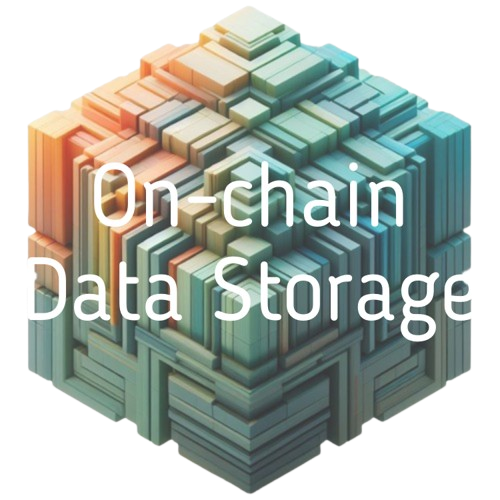
This row applies only to permanently storing data on the blockchain.
On-chain Data StorageGovernment Concerns
- That misinformation cannot be censored
- Illicit profits from non-original work
Consumer Risks
- Original artists not being able to censor copycats.
Cons to over-regulation
Cons to lack of regulation
Government Concerns
- That misinformation cannot be censored
- Illicit profits from non-original work
Consumer Risks
- Original artists not being able to censor copycats.
Cons to over-regulation
Cons to lack of regulation
Asset Layer - StablecoinsGovernment Concerns
- Ensuring stability and value preservation of stablecoins
- Preventing money laundering and illegal transactions
- Are stablecoins defined correctly in programming terms
- The effects of internal inflation based on the unlimited burning / minting mechanisms of popular stables
- Addressing potential systemic risks from widespread stablecoin adoption
- Does crypto transaction provenance equally replace not having serial numbers on gov't released stablecoins?
Consumer Risks
- Risk of stablecoin issuer insolvency or mismanagement
- Lack of transparency in stablecoin reserves and collateral
- Potential loss of value due to changes in underlying collateral
- Irrevocability of fraudulent transactions
Cons to over-regulation
- Hindering the growth and innovation of stablecoin use cases
- Restricting accessibility and availability of stablecoin services
- Imposing barriers for startups and new entrants in the stablecoin market
Cons to lack of regulation
- Lack of consumer protection and accountability in stablecoin issuance
- Vulnerability to financial crises or market manipulation
- Difficulty in addressing cross-border regulatory challenges
Does blockchain technology currently exist to fulfill these obligations, and if so, what is it?
Government Concerns
- Ensuring stability and value preservation of stablecoins
- Preventing money laundering and illegal transactions
- Are stablecoins defined correctly in programming terms
- The effects of internal inflation based on the unlimited burning / minting mechanisms of popular stables
- Addressing potential systemic risks from widespread stablecoin adoption
- Does crypto transaction provenance equally replace not having serial numbers on gov't released stablecoins?
Consumer Risks
- Risk of stablecoin issuer insolvency or mismanagement
- Lack of transparency in stablecoin reserves and collateral
- Potential loss of value due to changes in underlying collateral
- Irrevocability of fraudulent transactions
Cons to over-regulation
- Hindering the growth and innovation of stablecoin use cases
- Restricting accessibility and availability of stablecoin services
- Imposing barriers for startups and new entrants in the stablecoin market
Cons to lack of regulation
- Lack of consumer protection and accountability in stablecoin issuance
- Vulnerability to financial crises or market manipulation
- Difficulty in addressing cross-border regulatory challenges
Does blockchain technology currently exist to fulfill these obligations, and if so, what is it?
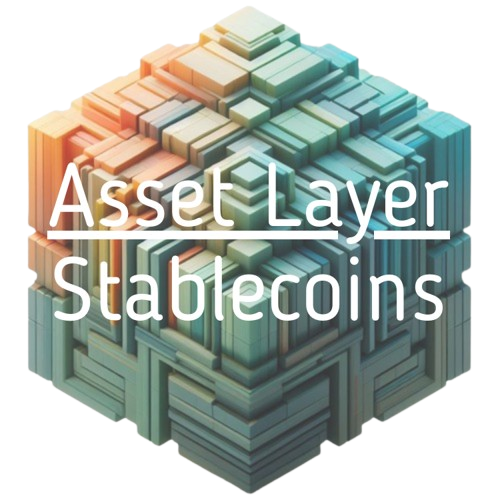
This row applies only to the asset layer, or token layer, and is only referring to stablecoins.
Asset Layer - StablecoinsGovernment Concerns
Consumer Risks
Cons to over-regulation
Cons to lack of regulation
Does blockchain technology currently exist to fulfill these obligations, and if so, what is it?
Government Concerns
Consumer Risks
Cons to over-regulation
Cons to lack of regulation
Does blockchain technology currently exist to fulfill these obligations, and if so, what is it?
Asset Layer - Fungible TokensGovernment Concerns
- Mutability presents a scenario of being "derived from the efforts of others" which leans towards being a security.
- Protecting consumers from fraudulent or misleading token offerings.
Consumer Risks
- Security of transactions: Ensuring that transactions involving fungible tokens are secure, protecting users from hacking, theft, or unauthorized access to their tokens.
- Centralization risks affecting token liquidity, market stability, and control.
Cons to over-regulation
- Overly stringent regulations could stifle innovation in fungible token use cases and hinder the growth of blockchain projects and applications.
- Excessive regulation might discourage token issuers and developers from exploring new models and tokenization methods.
Cons to lack of regulation
- Lack of regulatory oversight could lead to fraudulent or misleading token offerings, potentially resulting in financial losses for investors.
- Absence of clear regulations might deter legitimate projects from entering the market due to uncertainties surrounding legal compliance.
Does blockchain technology currently exist to fulfill these obligations, and if so, what is it?
Government Concerns
- Mutability presents a scenario of being "derived from the efforts of others" which leans towards being a security.
- Protecting consumers from fraudulent or misleading token offerings.
Consumer Risks
- Security of transactions: Ensuring that transactions involving fungible tokens are secure, protecting users from hacking, theft, or unauthorized access to their tokens.
- Centralization risks affecting token liquidity, market stability, and control.
Cons to over-regulation
- Overly stringent regulations could stifle innovation in fungible token use cases and hinder the growth of blockchain projects and applications.
- Excessive regulation might discourage token issuers and developers from exploring new models and tokenization methods.
Cons to lack of regulation
- Lack of regulatory oversight could lead to fraudulent or misleading token offerings, potentially resulting in financial losses for investors.
- Absence of clear regulations might deter legitimate projects from entering the market due to uncertainties surrounding legal compliance.
Does blockchain technology currently exist to fulfill these obligations, and if so, what is it?
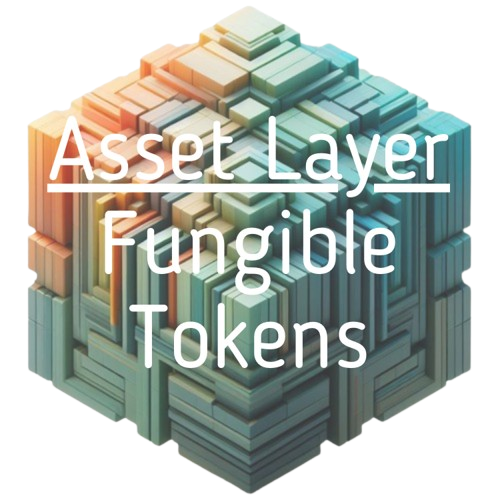
This row applies only to the asset layer, or token layer, and is only referring to fungible tokens.
Asset Layer - Fungible TokensGovernment Concerns
Consumer Risks
Cons to over-regulation
Cons to lack of regulation
Does blockchain technology currently exist to fulfill these obligations, and if so, what is it?
Government Concerns
Consumer Risks
Cons to over-regulation
Cons to lack of regulation
Does blockchain technology currently exist to fulfill these obligations, and if so, what is it?
Asset Layer - Non-Fungible Tokens (NFTs)Government Concerns
- classification uncertainty for diverse NFT assets like property records, medical records, or even voting mechanisms
- Data privacy of sensitive NFT content
- Not registering with FinCen or the SEC if selling securities
- Being a vehicle for money laundering
Consumer Risks
- Data exposure in NFTs, even with restricted access
- Ownership disputes over real-world asset NFTs
- Limited access to tokens due to over-regulation
- Inability to create securities in a regulated environment
Cons to over-regulation
- Stifled innovation due to heavy regulations
- Barrier to entry for startups due to compliance costs
- Lack of security standards and risk management standards
- Limited consumer protection from upgradable features
Cons to lack of regulation
- Vulnerability to NFT fraud without clear rules
- Ownership ambiguity leading to disputes
- Lack of potential international economic growth
Does blockchain technology currently exist to fulfill these obligations, and if so, what is it?
Government Concerns
- classification uncertainty for diverse NFT assets like property records, medical records, or even voting mechanisms
- Data privacy of sensitive NFT content
- Not registering with FinCen or the SEC if selling securities
- Being a vehicle for money laundering
Consumer Risks
- Data exposure in NFTs, even with restricted access
- Ownership disputes over real-world asset NFTs
- Limited access to tokens due to over-regulation
- Inability to create securities in a regulated environment
Cons to over-regulation
- Stifled innovation due to heavy regulations
- Barrier to entry for startups due to compliance costs
- Lack of security standards and risk management standards
- Limited consumer protection from upgradable features
Cons to lack of regulation
- Vulnerability to NFT fraud without clear rules
- Ownership ambiguity leading to disputes
- Lack of potential international economic growth
Does blockchain technology currently exist to fulfill these obligations, and if so, what is it?
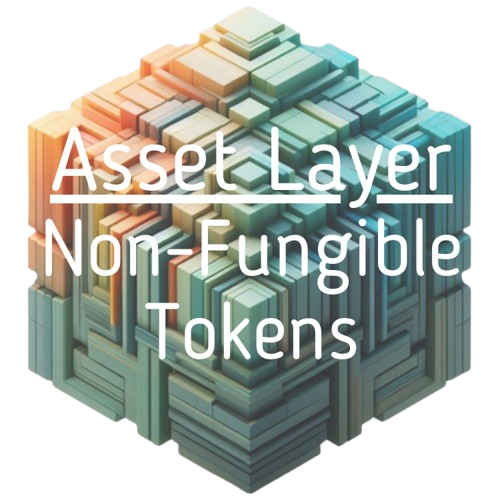
This row applies only to the asset layer, or token layer, and is only referring to non-fungible tokens (NFTs).
Asset Layer - Non-Fungible Tokens (NFTs)Government Concerns
Consumer Risks
Cons to over-regulation
Cons to lack of regulation
Does blockchain technology currently exist to fulfill these obligations, and if so, what is it?
Government Concerns
Consumer Risks
Cons to over-regulation
Cons to lack of regulation
Does blockchain technology currently exist to fulfill these obligations, and if so, what is it?
Exchange LayerGovernment Concerns
- Protecting consumers from loss of use due to a geopolitical situation
- Amount of electricity required to maintain the blockchain and the amount per transaction
Consumer Risks
- Potential geopolitical risks leading to electricity access disruptions
Cons to over-regulation
- Inability to use the blockchain to solve real-world problems
- Inhibiting technological growth
- Limiting economic growth
Cons to lack of regulation
- Potential risks of concentration and control by certain countries
Government Concerns
- Protecting consumers from loss of use due to a geopolitical situation
- Amount of electricity required to maintain the blockchain and the amount per transaction
Consumer Risks
- Potential geopolitical risks leading to electricity access disruptions
Cons to over-regulation
- Inability to use the blockchain to solve real-world problems
- Inhibiting technological growth
- Limiting economic growth
Cons to lack of regulation
- Potential risks of concentration and control by certain countries

This row applies to companies that operate as an exchange.
Exchange LayerGovernment Concerns
- Protecting Consumers from loss of use due to a geopolitical situation
- Amount of electricity required to maintain the blockchain and the amount per transaction
Consumer Risks
- Potential geopolitical risks leading to electricity access disruptions
Cons to over-regulation
- Potential geopolitical risks leading to electricity access disruptions
Cons to lack of regulation
- Potential risks of concentration and control by certain countries
Government Concerns
- Protecting Consumers from loss of use due to a geopolitical situation
- Amount of electricity required to maintain the blockchain and the amount per transaction
Consumer Risks
- Potential geopolitical risks leading to electricity access disruptions
Cons to over-regulation
- Potential geopolitical risks leading to electricity access disruptions
Cons to lack of regulation
- Potential risks of concentration and control by certain countries
Protocol LayerGovernment Concerns
- Protecting consumers from loss of use due to a geopolitical situation
- Amount of electricity required to maintain the blockchain and the amount per transaction
Consumer Risks
- Potential geopolitical risks leading to electricity access disruptions
Cons to over-regulation
- Inability to use the blockchain to solve real-world problems
- Inhibiting technological growth
- Limiting economic growth
Cons to lack of regulation
- Potential risks of concentration and control by certain countries
Government Concerns
- Protecting consumers from loss of use due to a geopolitical situation
- Amount of electricity required to maintain the blockchain and the amount per transaction
Consumer Risks
- Potential geopolitical risks leading to electricity access disruptions
Cons to over-regulation
- Inability to use the blockchain to solve real-world problems
- Inhibiting technological growth
- Limiting economic growth
Cons to lack of regulation
- Potential risks of concentration and control by certain countries

This row applies to companies that operate as a project deployed on the blockchain.
Protocol LayerGovernment Concerns
- Protecting Consumers from loss of use due to a geopolitical situation
- Amount of electricity required to maintain the blockchain and the amount per transaction
Consumer Risks
- Potential geopolitical risks leading to electricity access disruptions
Cons to over-regulation
- Potential geopolitical risks leading to electricity access disruptions
Cons to lack of regulation
- Potential risks of concentration and control by certain countries
Government Concerns
- Protecting Consumers from loss of use due to a geopolitical situation
- Amount of electricity required to maintain the blockchain and the amount per transaction
Consumer Risks
- Potential geopolitical risks leading to electricity access disruptions
Cons to over-regulation
- Potential geopolitical risks leading to electricity access disruptions
Cons to lack of regulation
- Potential risks of concentration and control by certain countries
Application LayerGovernment Concerns
- Protecting consumers from loss of use due to a geopolitical situation
- Amount of electricity required to maintain the blockchain and the amount per transaction
Consumer Risks
- Potential geopolitical risks leading to electricity access disruptions
Cons to over-regulation
- Inability to use the blockchain to solve real-world problems
- Inhibiting technological growth
- Limiting economic growth
Cons to lack of regulation
- Potential risks of concentration and control by certain countries
Government Concerns
- Protecting consumers from loss of use due to a geopolitical situation
- Amount of electricity required to maintain the blockchain and the amount per transaction
Consumer Risks
- Potential geopolitical risks leading to electricity access disruptions
Cons to over-regulation
- Inability to use the blockchain to solve real-world problems
- Inhibiting technological growth
- Limiting economic growth
Cons to lack of regulation
- Potential risks of concentration and control by certain countries

This row applies to companies that apps giving access to other protocols that are on the blockchain.
Application LayerGovernment Concerns
- Protecting Consumers from loss of use due to a geopolitical situation
- Amount of electricity required to maintain the blockchain and the amount per transaction
Consumer Risks
- Potential geopolitical risks leading to electricity access disruptions
Cons to over-regulation
- Potential geopolitical risks leading to electricity access disruptions
Cons to lack of regulation
- Potential risks of concentration and control by certain countries
Government Concerns
- Protecting Consumers from loss of use due to a geopolitical situation
- Amount of electricity required to maintain the blockchain and the amount per transaction
Consumer Risks
- Potential geopolitical risks leading to electricity access disruptions
Cons to over-regulation
- Potential geopolitical risks leading to electricity access disruptions
Cons to lack of regulation
- Potential risks of concentration and control by certain countries
Permanent Storage LayerGovernment Concerns
- Protecting consumers from loss of use due to a geopolitical situation
- Amount of electricity required to maintain the blockchain and the amount per transaction
Consumer Risks
- Potential geopolitical risks leading to electricity access disruptions
Cons to over-regulation
- Inability to use the blockchain to solve real-world problems
- Inhibiting technological growth
- Limiting economic growth
Cons to lack of regulation
- Potential risks of concentration and control by certain countries
Government Concerns
- Protecting consumers from loss of use due to a geopolitical situation
- Amount of electricity required to maintain the blockchain and the amount per transaction
Consumer Risks
- Potential geopolitical risks leading to electricity access disruptions
Cons to over-regulation
- Inability to use the blockchain to solve real-world problems
- Inhibiting technological growth
- Limiting economic growth
Cons to lack of regulation
- Potential risks of concentration and control by certain countries
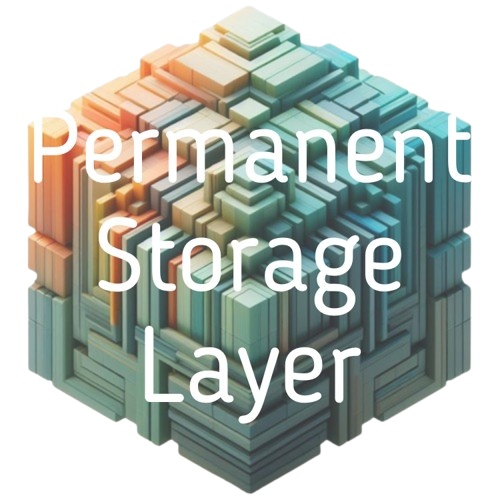
This row applies to protocols providing immutable data storage to their users.
Permanent Storage LayerGovernment Concerns
- Protecting Consumers from loss of use due to a geopolitical situation
- Amount of electricity required to maintain the blockchain and the amount per transaction
Consumer Risks
- Potential geopolitical risks leading to electricity access disruptions
Cons to over-regulation
- Potential geopolitical risks leading to electricity access disruptions
Cons to lack of regulation
- Potential risks of concentration and control by certain countries
Government Concerns
- Protecting Consumers from loss of use due to a geopolitical situation
- Amount of electricity required to maintain the blockchain and the amount per transaction
Consumer Risks
- Potential geopolitical risks leading to electricity access disruptions
Cons to over-regulation
- Potential geopolitical risks leading to electricity access disruptions
Cons to lack of regulation
- Potential risks of concentration and control by certain countries
Internet BrowserGovernment Concerns
- Protecting consumers from loss of use due to a geopolitical situation
- Amount of electricity required to maintain the blockchain and the amount per transaction
Consumer Risks
- Potential geopolitical risks leading to electricity access disruptions
Cons to over-regulation
- Inability to use the blockchain to solve real-world problems
- Inhibiting technological growth
- Limiting economic growth
Cons to lack of regulation
- Potential risks of concentration and control by certain countries
Government Concerns
- Protecting consumers from loss of use due to a geopolitical situation
- Amount of electricity required to maintain the blockchain and the amount per transaction
Consumer Risks
- Potential geopolitical risks leading to electricity access disruptions
Cons to over-regulation
- Inability to use the blockchain to solve real-world problems
- Inhibiting technological growth
- Limiting economic growth
Cons to lack of regulation
- Potential risks of concentration and control by certain countries

This row applies to internet browsers and their context of the blockchain.
Internet BrowserGovernment Concerns
- Protecting Consumers from loss of use due to a geopolitical situation
- Amount of electricity required to maintain the blockchain and the amount per transaction
Consumer Risks
- Potential geopolitical risks leading to electricity access disruptions
Cons to over-regulation
- Potential geopolitical risks leading to electricity access disruptions
Cons to lack of regulation
- Potential risks of concentration and control by certain countries
Government Concerns
- Protecting Consumers from loss of use due to a geopolitical situation
- Amount of electricity required to maintain the blockchain and the amount per transaction
Consumer Risks
- Potential geopolitical risks leading to electricity access disruptions
Cons to over-regulation
- Potential geopolitical risks leading to electricity access disruptions
Cons to lack of regulation
- Potential risks of concentration and control by certain countries
The DeveloperGovernment Concerns
- Protecting consumers from loss of use due to a geopolitical situation
- Amount of electricity required to maintain the blockchain and the amount per transaction
Consumer Risks
- Potential geopolitical risks leading to electricity access disruptions
Cons to over-regulation
- Inability to use the blockchain to solve real-world problems
- Inhibiting technological growth
- Limiting economic growth
Cons to lack of regulation
- Potential risks of concentration and control by certain countries
Government Concerns
- Protecting consumers from loss of use due to a geopolitical situation
- Amount of electricity required to maintain the blockchain and the amount per transaction
Consumer Risks
- Potential geopolitical risks leading to electricity access disruptions
Cons to over-regulation
- Inability to use the blockchain to solve real-world problems
- Inhibiting technological growth
- Limiting economic growth
Cons to lack of regulation
- Potential risks of concentration and control by certain countries

This row applies to developers who are coding any aspect of their project relating to the blockchain.
The DeveloperGovernment Concerns
- Protecting Consumers from loss of use due to a geopolitical situation
- Amount of electricity required to maintain the blockchain and the amount per transaction
Consumer Risks
- Potential geopolitical risks leading to electricity access disruptions
Cons to over-regulation
- Potential geopolitical risks leading to electricity access disruptions
Cons to lack of regulation
- Potential risks of concentration and control by certain countries
Government Concerns
- Protecting Consumers from loss of use due to a geopolitical situation
- Amount of electricity required to maintain the blockchain and the amount per transaction
Consumer Risks
- Potential geopolitical risks leading to electricity access disruptions
Cons to over-regulation
- Potential geopolitical risks leading to electricity access disruptions
Cons to lack of regulation
- Potential risks of concentration and control by certain countries
DeFi Architecture and SecurityGovernment Concerns
- Protecting consumers from loss of use due to a geopolitical situation
- Amount of electricity required to maintain the blockchain and the amount per transaction
Consumer Risks
- Potential geopolitical risks leading to electricity access disruptions
Cons to over-regulation
- Inability to use the blockchain to solve real-world problems
- Inhibiting technological growth
- Limiting economic growth
Cons to lack of regulation
- Potential risks of concentration and control by certain countries
Government Concerns
- Protecting consumers from loss of use due to a geopolitical situation
- Amount of electricity required to maintain the blockchain and the amount per transaction
Consumer Risks
- Potential geopolitical risks leading to electricity access disruptions
Cons to over-regulation
- Inability to use the blockchain to solve real-world problems
- Inhibiting technological growth
- Limiting economic growth
Cons to lack of regulation
- Potential risks of concentration and control by certain countries
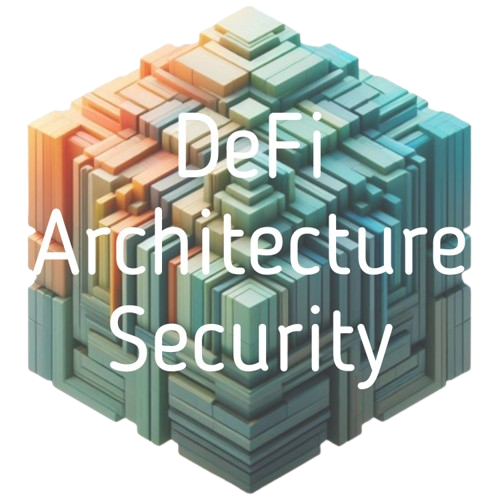
This row applies to the security of DeFi architecture concerning the dependency of other third-party apps when building on the blockchain.
DeFi Architecture and SecurityGovernment Concerns
- Protecting Consumers from loss of use due to a geopolitical situation
- Amount of electricity required to maintain the blockchain and the amount per transaction
Consumer Risks
- Potential geopolitical risks leading to electricity access disruptions
Cons to over-regulation
- Potential geopolitical risks leading to electricity access disruptions
Cons to lack of regulation
- Potential risks of concentration and control by certain countries
Government Concerns
- Protecting Consumers from loss of use due to a geopolitical situation
- Amount of electricity required to maintain the blockchain and the amount per transaction
Consumer Risks
- Potential geopolitical risks leading to electricity access disruptions
Cons to over-regulation
- Potential geopolitical risks leading to electricity access disruptions
Cons to lack of regulation
- Potential risks of concentration and control by certain countries
DeFi Architecture Standards / AuditorGovernment Concerns
- Protecting consumers from loss of use due to a geopolitical situation
- Amount of electricity required to maintain the blockchain and the amount per transaction
Consumer Risks
- Potential geopolitical risks leading to electricity access disruptions
Cons to over-regulation
- Inability to use the blockchain to solve real-world problems
- Inhibiting technological growth
- Limiting economic growth
Cons to lack of regulation
- Potential risks of concentration and control by certain countries
Government Concerns
- Protecting consumers from loss of use due to a geopolitical situation
- Amount of electricity required to maintain the blockchain and the amount per transaction
Consumer Risks
- Potential geopolitical risks leading to electricity access disruptions
Cons to over-regulation
- Inability to use the blockchain to solve real-world problems
- Inhibiting technological growth
- Limiting economic growth
Cons to lack of regulation
- Potential risks of concentration and control by certain countries
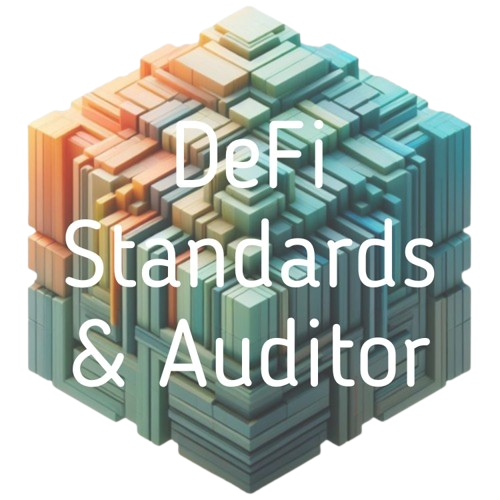
This row applies to creating standards for the DeFi Stack and its Architecture, and for future DeFi Interopability Auditors.
DeFi Architecture Standards / AuditorGovernment Concerns
- Protecting Consumers from loss of use due to a geopolitical situation
- Amount of electricity required to maintain the blockchain and the amount per transaction
Consumer Risks
- Potential geopolitical risks leading to electricity access disruptions
Cons to over-regulation
- Potential geopolitical risks leading to electricity access disruptions
Cons to lack of regulation
- Potential risks of concentration and control by certain countries
Government Concerns
- Protecting Consumers from loss of use due to a geopolitical situation
- Amount of electricity required to maintain the blockchain and the amount per transaction
Consumer Risks
- Potential geopolitical risks leading to electricity access disruptions
Cons to over-regulation
- Potential geopolitical risks leading to electricity access disruptions
Cons to lack of regulation
- Potential risks of concentration and control by certain countries
Fiat Onboarding / Offboarding AccessGovernment Concerns
- Protecting consumers from loss of use due to a geopolitical situation
- Amount of electricity required to maintain the blockchain and the amount per transaction
Consumer Risks
- Potential geopolitical risks leading to electricity access disruptions
Cons to over-regulation
- Inability to use the blockchain to solve real-world problems
- Inhibiting technological growth
- Limiting economic growth
Cons to lack of regulation
- Potential risks of concentration and control by certain countries
Government Concerns
- Protecting consumers from loss of use due to a geopolitical situation
- Amount of electricity required to maintain the blockchain and the amount per transaction
Consumer Risks
- Potential geopolitical risks leading to electricity access disruptions
Cons to over-regulation
- Inability to use the blockchain to solve real-world problems
- Inhibiting technological growth
- Limiting economic growth
Cons to lack of regulation
- Potential risks of concentration and control by certain countries

This row applies to protocols providing access for users to onboard and offboard fiat to their users.
Fiat Onboarding / Offboarding AccessGovernment Concerns
- Protecting Consumers from loss of use due to a geopolitical situation
- Amount of electricity required to maintain the blockchain and the amount per transaction
Consumer Risks
- Potential geopolitical risks leading to electricity access disruptions
Cons to over-regulation
- Potential geopolitical risks leading to electricity access disruptions
Cons to lack of regulation
- Potential risks of concentration and control by certain countries
Government Concerns
- Protecting Consumers from loss of use due to a geopolitical situation
- Amount of electricity required to maintain the blockchain and the amount per transaction
Consumer Risks
- Potential geopolitical risks leading to electricity access disruptions
Cons to over-regulation
- Potential geopolitical risks leading to electricity access disruptions
Cons to lack of regulation
- Potential risks of concentration and control by certain countries
